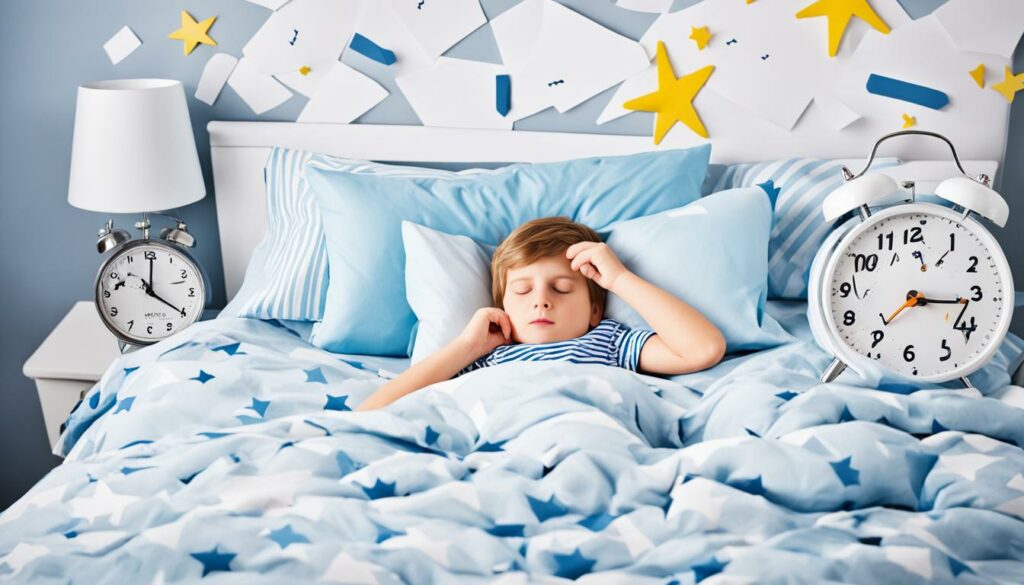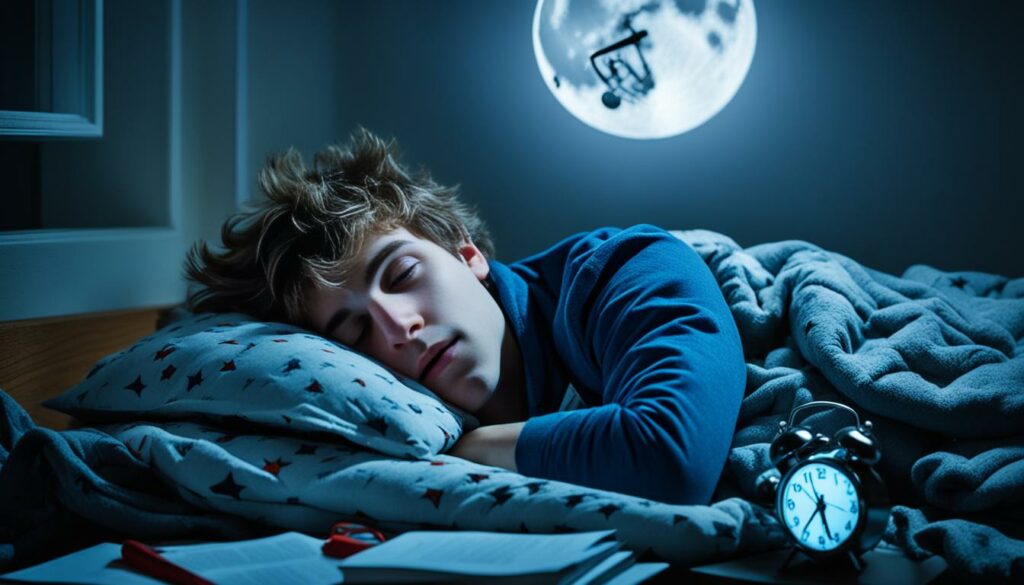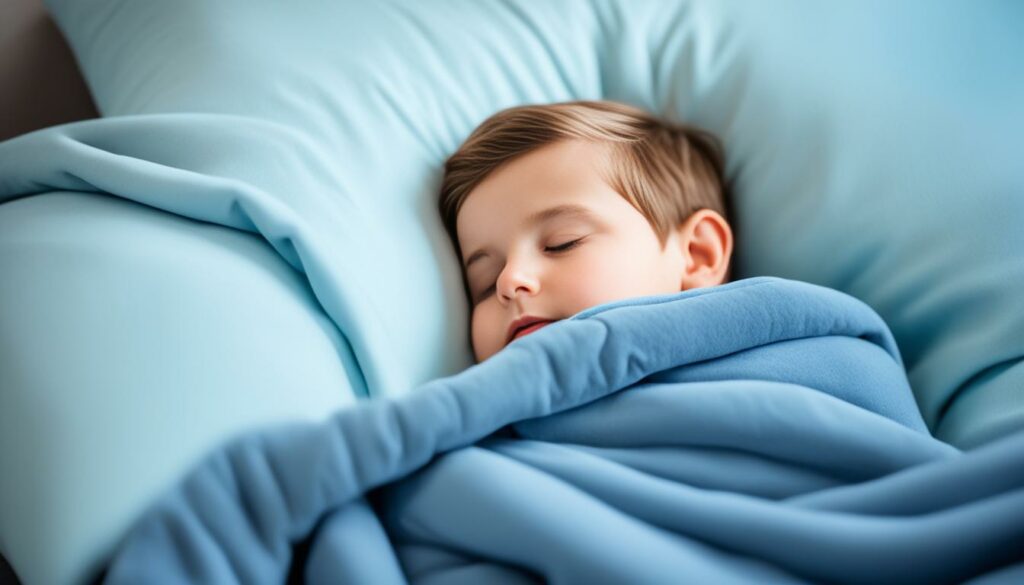Did you know that up to 70% of children with ADHD struggle with falling asleep? And about half of the parents of these children consider their sleep difficulties to be moderate to severe. The impact of sleep problems in children with ADHD is significant, affecting their daily functioning, academic performance, and overall quality of life.
Sleep problems commonly reported by parents include difficulty getting the child into bed, worries and anxiety at bedtime, insomnia, delayed sleep phase, and sleep associations. These challenges can be attributed to various factors such as stimulant medication, anxiety, and biological factors.
But don’t worry, there are solutions to improve sleep for toddlers with ADHD. By implementing specific strategies and creating healthy sleep habits, parents can help their children get the restful nights they need.
Come explore the common sleep problems in children with ADHD, the impact of sleep on their well-being, and effective strategies to improve their sleep in this comprehensive guide.
Key Takeaways:
- Up to 70% of children with ADHD struggle with falling asleep.
- Sleep problems in children with ADHD can significantly impact their daily functioning and quality of life.
- Common sleep problems in children with ADHD include difficulty getting into bed, anxiety at bedtime, insomnia, delayed sleep phase, and sleep associations.
- Improving sleep can help alleviate ADHD symptom severity and improve overall well-being.
- Strategies for improving toddler sleep with ADHD include establishing a bedtime routine, creating a sleep-friendly environment, and seeking professional help if necessary.
Common Sleep Problems in Children with ADHD
Children with ADHD often experience various sleep problems that can affect their ability to get a good night’s rest. These sleep problems include:
- Difficulty getting into bed
- Worries and anxiety at bedtime
- Insomnia
- Delayed sleep phase
- Sleep associations
Additionally, children with ADHD may also face medical sleep problems such as obstructive sleep apnea and restless legs syndrome. The co-occurrence of anxiety and behavioral difficulties in children with ADHD can contribute to these sleep problems. Researchers have also found differences in the production of melatonin, a hormone that regulates sleep-wake cycles, between children with and without ADHD.
“Sleep problems can significantly impact the daily lives of children with ADHD, affecting their overall well-being and functioning. By understanding the common sleep issues that children with ADHD face, parents and caregivers can implement strategies to improve their sleep quality and overall sleep routine.”
It is important to address these sleep problems in order to provide children with ADHD the restful sleep they need to thrive. In the following sections, we will explore the impact of sleep on children with ADHD, as well as strategies and tips for improving their sleep.
Impact of Sleep in Children with ADHD
Research has shown that sleep difficulties in children with ADHD can have significant ramifications on various aspects of their lives. Not only can these sleep problems exacerbate ADHD symptom severity, but they can also negatively impact the child’s overall quality of life. Moreover, inadequate sleep has been linked to increased mental health difficulties in children with ADHD. Additionally, sleep problems can also affect academic performance, further adding to the challenges faced by these children.
Improving the quality and quantity of sleep in children with ADHD is crucial for their well-being and overall functioning. Addressing sleep issues can lead to improvements in ADHD symptoms, enhance the child’s overall quality of life, and potentially alleviate mental health difficulties. Furthermore, by improving sleep, children with ADHD may experience improvements in their academic performance, as adequate sleep facilitates cognitive functioning and attention.
Providing parents with time for themselves in the evening is another significant benefit of improving sleep in children with ADHD. By ensuring that their child’s sleep is more restful and uninterrupted, parents can have valuable moments of respite and take care of their own well-being.
The Link Between Sleep and ADHD Symptom Severity
Multiple studies have demonstrated a link between sleep difficulties and ADHD symptom severity in children. Sleep problems such as difficulty falling asleep, maintaining sleep, and experiencing fragmented sleep have been found to be associated with increased ADHD symptomatology. Additionally, poor sleep quality can heighten hyperactivity, impulsivity, and inattentiveness, further exacerbating ADHD symptoms.
Sleep and Quality of Life
Poor sleep quality and chronic sleep deprivation can significantly diminish the quality of life experienced by children with ADHD. Sleep problems can lead to daytime sleepiness, fatigue, irritability, difficulties with emotional regulation, and impaired social functioning. These factors can adversely affect the child’s relationships, academic performance, and overall happiness and well-being.
Impact on Mental Health Difficulties
Sleep difficulties can also contribute to increased mental health difficulties in children with ADHD. Anxiety and depressive symptoms are common among children with ADHD, and inadequate sleep can exacerbate these conditions. Furthermore, untreated sleep problems can contribute to the development or worsening of mood disorders, thus emphasizing the importance of addressing sleep issues in children with ADHD.
Academic Performance
Sleep problems can significantly hinder academic performance in children with ADHD. Inadequate sleep can lead to difficulties with attention, concentration, memory, and cognitive processing, all of which are vital for effective learning. By improving sleep, children with ADHD may experience enhanced cognitive functioning, improved attention, and better academic outcomes, fostering their success in the academic realm.

| Effect of Sleep on ADHD Symptoms | Impact on Quality of Life | Effect on Mental Health Difficulties | Influence on Academic Performance |
|---|---|---|---|
| Worsens ADHD symptom severity | Decreases quality of life | Increases mental health difficulties | Impacts academic performance |
Strategies for Improving Toddler Sleep with ADHD
When it comes to improving sleep for toddlers with ADHD, implementing a bedtime routine is key. A consistent, calm, and relaxing routine should be established, starting approximately 30 to 60 minutes before bed. This routine helps signal to the child that it’s time to wind down and prepare for sleep. It can include activities such as bath time, reading a book, or engaging in calming activities.
One important aspect of improving sleep for toddlers with ADHD is ensuring a time appropriate for bedtime. It is essential to establish a consistent bedtime that allows for an adequate amount of sleep for their age. Consult with healthcare professionals or refer to sleep guidelines for age-appropriate sleep durations.
Limiting screen time before bed is another effective strategy. The blue light emitted by electronic devices can interfere with the production of melatonin, the hormone that helps regulate sleep. Encourage screen-free activities, such as reading or playing quiet games, in the evening hours.
The bedroom environment plays a crucial role in promoting better sleep. Create a sleep-friendly space that is comfortable, quiet, and conducive to rest. Consider factors such as temperature, lighting, and noise. The use of blackout curtains, a white noise machine, or a cozy blanket can help create a soothing atmosphere.
There are also specific sleep strategies that can be implemented based on the child’s individual sleep issues. Here are some examples:
- Bedtime Pass: Introduce a bedtime pass that allows the child to leave their bedroom once during the night for a specific reason, such as using the bathroom. This can help reduce bedtime resistance.
- The Checking Method: Gradually decrease the frequency of checking on the child during bedtime to help them become more self-reliant and confident in falling asleep.
- Worry Books or Boxes: Encourage the child to write down any worries or concerns before bed and place them in a designated worry book or box. This practice helps alleviate anxiety and promotes a peaceful mindset for sleep.
- Visual Imagery and Relaxation Exercises: Teach the child calming techniques, such as deep breathing or imagining a peaceful setting, to promote relaxation and prepare for sleep.
- Camping Out: Gradually move out of the child’s room over time, starting by sitting beside the bed and eventually transitioning to sitting outside the room. This strategy helps the child become more independent in falling asleep.
By implementing these strategies and tailoring them to the specific sleep issues of toddlers with ADHD, parents can help create an environment conducive to restful nights and better sleep quality.

| Strategies for Improving Toddler Sleep with ADHD | |
|---|---|
| Establish a consistent, calm, and relaxing bedtime routine | ✔ |
| Set a time appropriate for bedtime | ✔ |
| Limit screen time before bed | ✔ |
| Create a sleep-friendly bedroom environment | ✔ |
| Implement specific sleep strategies based on the child’s sleep issues | ✔ |
Sleep Issues in Adolescents with ADHD
Adolescents with ADHD are no strangers to sleep problems, which can include insomnia and delayed sleep phase. Various factors, such as puberty and the transition to high school, can disrupt sleep patterns for adolescents with ADHD. However, there are healthy sleep habits that can help improve their quality of sleep.
One important aspect of promoting better sleep is regular exercise. Engaging in physical activity during the day can help regulate the sleep-wake cycle and promote better sleep at night. Additionally, exposure to natural light, especially in the morning, can help synchronize the body’s internal clock and improve sleep quality.
Caffeine, a stimulant found in many beverages and snacks, should be avoided close to bedtime as it can interfere with falling asleep. Establishing a consistent sleep schedule that allows for an adequate amount of sleep can also be beneficial for adolescents with ADHD.
It’s important to create an environment that promotes relaxation and good sleep hygiene. This can include optimizing the bedroom space for sleep, removing distractions such as screens from the bedroom, and ensuring a comfortable sleeping environment.
Overall, implementing healthy sleep habits and addressing any specific sleep issues can greatly improve the sleep quality of adolescents with ADHD. By prioritizing a consistent sleep routine, regular exercise, and a sleep-friendly environment, adolescents with ADHD can enjoy better sleep and overall well-being.

Expert Insight:
“Adolescents with ADHD often struggle with sleep problems, which can worsen their ADHD symptoms and overall quality of life. Establishing healthy sleep habits and creating a sleep-friendly environment is crucial for their well-being.”
– Dr. Emily Smith, Child Sleep Specialist
Professional Help for Managing Sleep Difficulties
Implementing behavioral strategies can be a valuable approach in managing sleep difficulties experienced by children with ADHD. These strategies help establish a structured sleep routine and promote healthy sleep habits, which can significantly improve their overall sleep quality.
If sleep difficulties persist despite implementing these strategies, it is advisable to seek professional support. Consulting with a doctor or a sleep specialist who specializes in ADHD can provide crucial guidance and assistance in managing sleep problems effectively.
Doctors can offer valuable insights into managing medication side effects that may be impacting sleep. This guidance helps ensure that the child’s medication regimen is optimized to minimize any sleep-related disruptions.
Furthermore, doctors may consider the use of melatonin as a supplement to improve sleep in children with ADHD. Melatonin is naturally produced by the body to regulate sleep-wake cycles, and supplementation can help address sleep disturbances in some cases.
To summarize, a combination of behavioral strategies, professional guidance, and potential use of melatonin can be instrumental in managing sleep difficulties in children with ADHD, leading to improved sleep quality and overall well-being.
| Advantages of Professional Help for Sleep Difficulties in ADHD | Behavioral Strategies | Medication Side Effects | Using Melatonin |
|---|---|---|---|
| Guidance from experts in ADHD and sleep disorders | Establishing a structured sleep routine | Optimizing medication regimen for better sleep | Supplementing melatonin to improve sleep quality |
| Personalized recommendations based on individual needs | Promoting healthy sleep habits | Addressing sleep disturbances caused by medication | Regulating sleep-wake cycles |
| Expertise in managing co-occurring conditions impacting sleep | Addressing anxiety and worries associated with bedtime | Minimizing disruptions caused by medication side effects | Enhancing overall sleep quality in children with ADHD |
Tips from Dr. Harvey Karp
To help promote better sleep in children with ADHD, renowned pediatrician Dr. Harvey Karp shares some valuable tips:
1. Daily Exercise:
Encourage your child to engage in daily physical activity, such as going for a bike ride, playing a sport, or taking a walk. Exercise can help release pent-up energy and promote better sleep.
2. Provide Healthy Meals:
Offer nutritious meals and snacks throughout the day, including plenty of fruits, vegetables, whole grains, and lean proteins. Avoiding artificial colors and flavors can help minimize hyperactivity and improve sleep quality.
3. Limit Caffeine:
Avoid giving caffeinated beverages or foods to your child, especially in the hours leading up to bedtime. Caffeine can interfere with sleep and contribute to restlessness.
4. Establish a Consistent Nap Schedule:
Ensure your child has a consistent nap schedule during the day. Napping too close to bedtime can make it harder for them to fall asleep at night.
5. Implement Pre-Bedtime Routines:
Create a calm and soothing pre-bedtime routine that helps your child wind down before sleep. This can include activities like reading a book, taking a warm bath, or practicing relaxation techniques like deep breathing.
6. Remove Screens from the Bedroom:
Keep electronic devices, such as smartphones, tablets, and TVs, out of your child’s bedroom. The blue light emitted by screens can disrupt the sleep-wake cycle and make it harder for them to fall asleep.
7. Ensure Bedtime Before Overtiredness:
Establish an age-appropriate bedtime for your child, ensuring they go to bed before becoming overtired. An overtired child may struggle to fall asleep and experience more restless nights.
8. Discuss Medication Side Effects:
If your child is taking medication for their ADHD, talk to their healthcare provider about any potential side effects that may affect their sleep. Together, you can find the best approach to manage medication-related sleep difficulties.

Conclusion
Sleep problems are common in children with ADHD and can significantly impact their daily functioning and overall well-being. Fortunately, there are several strategies that parents can implement to improve sleep for their child with ADHD.
One key approach is establishing a consistent bedtime routine, which helps signal to the child that it’s time to wind down and prepare for sleep. Creating a sleep-friendly environment, free from distractions and stimulating screens, can also promote better sleep. Additionally, seeking professional help, such as guidance from a doctor or sleep specialist, can be instrumental in addressing any underlying sleep issues and managing medication side effects if necessary.
By prioritizing healthy sleep habits and addressing sleep difficulties, parents can help their child with ADHD achieve more restful and peaceful nights. With improved sleep, children with ADHD can experience enhanced daily functioning, improved academic performance, and an overall better quality of life.
